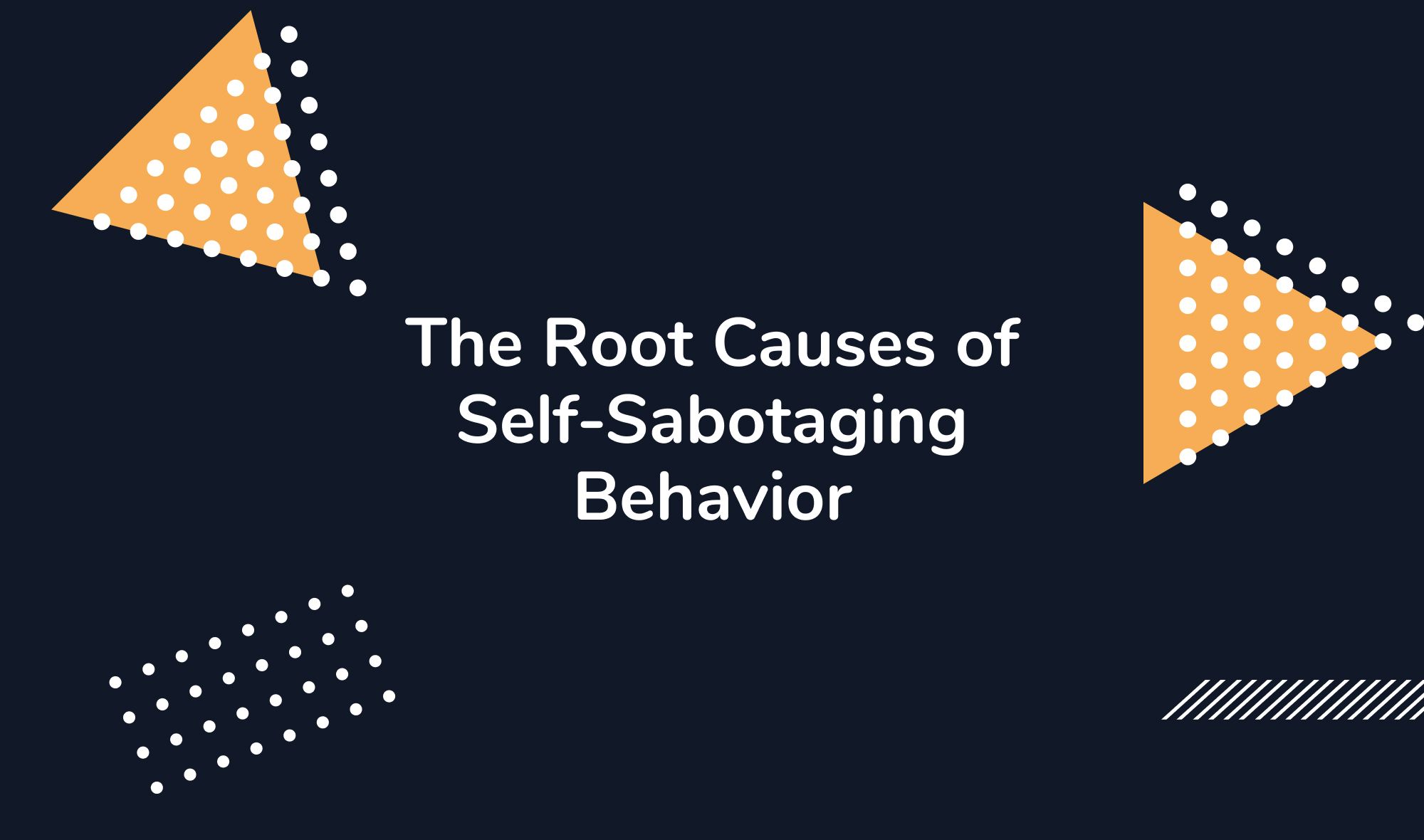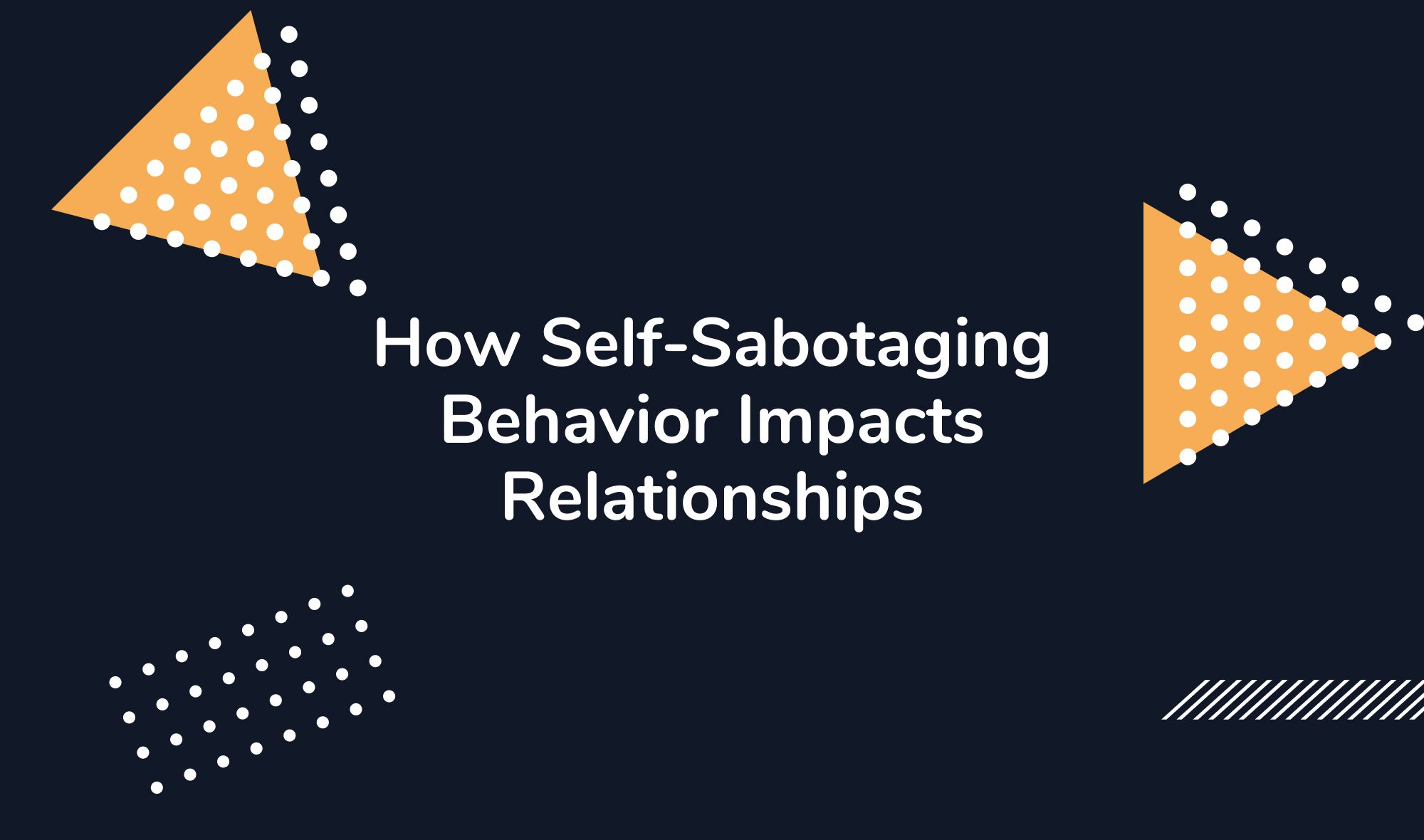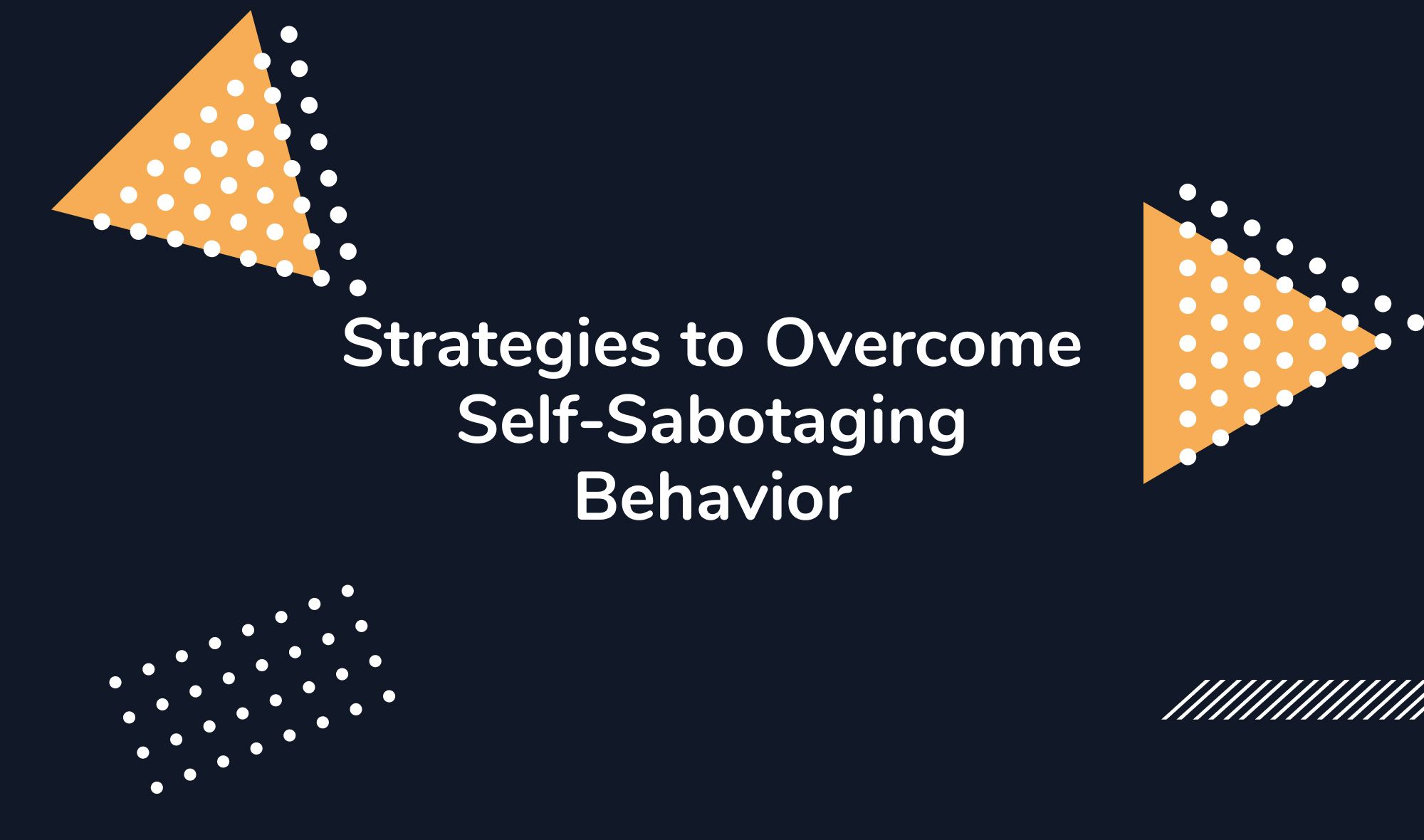Overcoming Self-Sabotaging Behavior: A Comprehensive Guide
By Remy Meraz • June 28, 2023
Key Takeaways
- Self-sabotaging behaviors are often driven by fear, lack of self-awareness, self-doubt, and perfectionism.
- Such behaviors can significantly impact personal and professional relationships.
- Overcoming self-sabotage requires self-awareness, behavior change, moderation, and proactive management of procrastination and perfectionism.

Do you ever find yourself caught in a cycle of setting ambitious goals, only to undermine your own efforts to achieve them? Have you noticed a pattern of procrastination when it's time to take the critical first step? Do you frequently catch yourself grappling with self-doubt and extreme self-criticism? If your answer to any of these questions is yes, you might be dealing with a case of self-sabotage.
In our journey towards personal growth and achieving our goals, we sometimes become our own greatest obstacle. Self-sabotaging behaviors are harmful patterns that can hinder us from reaching our fullest potential. Perfectionism, lack of moderation, procrastination, and poor communication are common forms of self-sabotage that many of us struggle with.
But why do we do this to ourselves? The answer lies in understanding the mechanisms of self-sabotage and the role of self-awareness in overcoming these patterns. This article will delve into the intricacies of self-sabotaging behavior, providing insights into why we do it, its impacts, and most importantly, how we can instigate a behavior change to break free from these self-destructive patterns.
From mastering the art of moderation to boosting self-awareness and developing healthier communication habits, our journey will be guided by a blend of science, practical wisdom, and personal experiences. Together, let's explore the path to change and self-mastery, leaving self-sabotage behind us.
In this comprehensive guide, we'll unravel the mystery of self-sabotage, laying out a roadmap to guide you towards healthier behavior patterns, setting you on the path to achieve your goals. Let's get started on this transformative journey.
Join our Newsletter
Transform your career with our personal growth insights. Get one valuable tip right in your inbox every Saturday morning.
Understanding Self-Sabotaging Behavior
Before we can take steps to change self-sabotaging behaviors, we must first understand what they are and why they happen.
The Psychology Behind Self-Sabotaging Behavior
Self-sabotaging behavior is a complex issue rooted in our psychology. It's essentially a misalignment between our conscious desires (such as achieving goals) and our subconscious beliefs and fears. This misalignment causes us to engage in actions that directly contradict our stated intentions, leading us down a path of self-sabotage.
One psychological theory posits that self-sabotage arises from our inherent fear of failure or success. We may fear the unknowns that success brings or be apprehensive about the judgments or expectations that come with failure. As a result, we engage in self-sabotaging behaviors as a form of self-protection, even if they hinder our progress.
For a more in-depth look at the psychology behind this, I recommend "Psychology Applied to Modern Life", which offers a comprehensive exploration into how our minds work and the reasons behind various behaviors, including self-sabotage.
Common Types and Examples of Self-Sabotaging Behaviors
While self-sabotaging behaviors can take many forms, two of the most common are perfectionism and procrastination.
- Perfectionism: This is a behavior pattern where one sets excessively high and often unrealistic standards for themselves, leading to feelings of inadequacy and failure when these standards aren't met. It can result in a debilitating fear of making mistakes, which can ultimately hamper progress and productivity.
- Procrastination: Procrastination is the act of delaying or postponing tasks or decisions, often leading to stress, poor performance, and feelings of guilt. People usually procrastinate due to fear of failure, lack of motivation, or feeling overwhelmed by a task.
For a deep dive into these and other types of self-sabotaging behaviors, consider reading "Why Did I Do That? Understanding and Mastering Your Self-Sabotaging Behavior" and "Taming Your Outer Child: Overcoming Self-Sabotage — the Aftermath of Abandonment". These books offer real-world examples, personal stories, and practical strategies to understand and overcome self-sabotage.
By understanding the psychology behind these behaviors and recognizing how they manifest in our lives, we can begin the process of overcoming self-sabotage and breaking free from these destructive patterns.
The Root Causes of Self-Sabotaging Behavior

To change self-sabotaging behavior, it's crucial to identify its root causes. These deep-seated issues often underlie and trigger destructive patterns.
Fear of Change and the Unknown
Change can be intimidating, especially when it involves moving into uncharted territory. This fear of the unknown can hold us back, causing us to cling to familiar patterns—even if they're harmful—simply because they're comfortable. This resistance to change can be a significant factor in self-sabotaging behavior.
I delve into this topic further in my blog post "Navigating the Unknown: Strategies for Coping with Existential Dread", where I discuss strategies for overcoming fear and embracing change.
Lack of Self-Awareness and Introspection
A lack of self-awareness often plays a role in self-sabotaging behaviors. If we're unaware of our thoughts, feelings, and behaviors, it's difficult to recognize when we're engaging in self-sabotage. Building self-awareness through introspection allows us to identify these behaviors and take steps to change them.
To build this crucial skill, check out "Exploring Your Shadow Self: 30 Day Shadow Work Prompts to Deepen Your Self-Awareness" on my blog. Or check out our top 10 recommended Shadow Work books to deepen your self-awareness and facilitate personal growth.
Self-Doubt and Negative Self-Talk
Self-doubt and negative self-talk can eat away at our confidence, making us believe that we're incapable or unworthy. This self-criticism can become so ingrained that it leads to self-sabotaging behavior.
In "How Insecure Are You? Mastering Your Mindset to Conquer Self-Doubt", I discuss strategies to overcome self-doubt and foster a more positive self-image.
Join our Newsletter
Transform your career with our personal growth insights. Get one valuable tip right in your inbox every Saturday morning.
Perfectionism and All-Or-Nothing Thinking
Perfectionism often involves all-or-nothing thinking—we feel that if we can't do something perfectly, it's not worth doing at all. This mindset can lead us to self-sabotage our efforts out of fear of failing to meet our own unrealistic standards.
The "Self-Sabotage Behavior Workbook" provides a step-by-step guide to overcoming perfectionism and other forms of self-sabotage.
By understanding and addressing these root causes, we can begin to dismantle self-sabotaging behavior and pave the way towards a healthier and more productive mindset.
For a deeper understanding of self-sabotage, explore your shadow self and its role in these behaviors.
How Self-Sabotaging Behavior Impacts Relationships

Self-sabotaging behavior doesn't only affect our personal lives and goals, it can also significantly influence our relationships, often fostering a cycle of conflict and misunderstanding.
The Role of Self-Sabotage in Relationship Issues
At the core of many relationship issues is self-sabotage. It's a way we unintentionally create problems and obstacles in our relationships, typically out of fear or self-doubt. To build healthier relationships, we need to identify these behaviors and learn how to navigate them.
For more on this, I recommend reading my blog post on "Compassion vs Empathy" to better understand the emotional dynamics that influence our relationships.
Communication Patterns and Reluctance to Speak
Effective communication is crucial to any relationship, yet self-sabotaging behaviors can significantly hinder our ability to communicate openly and honestly. A fear of vulnerability, rejection, or conflict might cause us to withhold our feelings, leading to a pattern of miscommunication and misunderstandings.
I discuss effective communication strategies in my blog post, "Creating Harmony: Expert Strategies for Managing Conflict at the Workplace".
Self-Sabotaging Relationships and Its Consequences
When we engage in self-sabotaging behaviors, we risk not just our personal well-being but also the health and longevity of our relationships. By understanding these behaviors, we can learn how to prevent them and foster more fulfilling connections.
For further insights, consider tuning into "The Self-Sabotage To Success Podcast" and "Stop the Self Sabotage and Create the Life You Desire", which offer deep dives into these topics.
Understanding how self-sabotage impacts our relationships is the first step toward breaking these patterns and fostering healthier, more satisfying connections.
Strategies to Overcome Self-Sabotaging Behavior

Understanding our self-sabotaging behaviors is crucial, but the journey doesn't stop there. The next step is to take active measures to overcome these behaviors. Here are some strategies to start with.
Importance of Self-Awareness and Introspection
Greater self-awareness and introspection are essential in identifying our self-sabotaging patterns. They allow us to explore our motivations, behaviors, and emotions on a deeper level, leading us toward healthier choices.
Check out my blog post "45 Deep Questions That Make You Think Differently About Life" to facilitate introspection and self-awareness.
Change Behavior Patterns and Goal Setting
To break self-sabotaging patterns, we need to change our behavior. This change can start by setting realistic goals that guide us towards healthier habits and behaviors. By achieving these goals, we can cultivate a greater sense of self-worth and efficacy.
To learn more, read my post on "Elevate Your Career: Professional Development Tips to Implement Two Weeks from Today".
Practice Moderation and Setting Boundaries
Practicing moderation and setting boundaries are valuable strategies to manage self-sabotaging behaviors. These can help us maintain a healthy balance in our lives and prevent feelings of burnout or overwhelming stress.
Read more on how to create a culture of self-advocacy in my blog post, "Creating a Culture of Self-Advocacy: Why It’s Important and How to Do It".
Addressing Procrastination and Perfectionism
Procrastination and perfectionism are two self-sabotaging behaviors that often go hand-in-hand. By addressing these behaviors head-on, we can work towards more balanced attitudes and greater productivity.
For strategies on overcoming these behaviors, refer to my blog post "People Better Than Me: How to Transform Comparison into Motivation". Also, consider reading "The Mountain You: Transforming Self-Sabotage into Self-Mastery" for a deep-dive into overcoming self-sabotage.
By implementing these strategies, we can start to break free from the cycle of self-sabotage and embrace healthier behaviors and attitudes.
Conclusion
Understanding and overcoming self-sabotaging behaviors is a journey that requires self-awareness, introspection, and the courage to challenge ingrained patterns of behavior. These behaviors, often rooted in fear of change, lack of self-awareness, self-doubt, and perfectionism, can have profound impacts not only on our relationship with ourselves but also with others around us. They can manifest as procrastination, negative self-talk, and even sabotage our relationships.
Yet, the power to change these patterns lies within us. By cultivating self-awareness and introspection, altering our behavior patterns, practicing moderation, setting boundaries, and addressing procrastination and perfectionism, we can dismantle the structures of self-sabotage. The journey may be challenging, but it's absolutely worthwhile.
To gain a deeper understanding of self-awareness, you can explore Erikson's Stages of Psychosocial Development and how they relate to personal growth here.
Remember, the goal isn't to become perfect but to become more aware and accepting of ourselves. The journey towards overcoming self-sabotage isn't a straight line; it's a path with ups and downs. Each step you take, no matter how small, is a victory worth celebrating.
Keep striving, keep growing, and remember: You are more than your self-sabotaging behaviors. You have the power to change, to grow, and to create a fulfilling life. The journey starts with you.
To better yourself check out our blog on Life and career coaching: FAQs.
Read more about: Imposter Syndrome, Professional Development
About Remy Meraz
Remy Meraz, co-founder, and CEO of Zella Life, is a visionary leader who leveraged corporate glass ceiling challenges as a woman of color to drive systemic change.
While leading and cultivating high-performance teams from VC-backed startups to Fortune 500, she consistently faced obstacles such as inadequate mentorship, lack of psychological safety, and non-personalized training. Taking matters into her own hands, she turned to executive coaching and NLP training. This life-changing growth experience led to breaking leadership barriers and a passion for cognitive psychology.
Motivated by her experiences, she co-founded Zella Life, an innovative AI-driven coaching platform bridging the talent development gap by enhancing soft skills and emotional intelligence (EQ) in the workplace.
Her vision with Zella Life is to transform professional development into an inclusive and impactful journey, focused on the distinct needs of both individuals and organizations. She aims to promote advancement and culture change by ensuring every professional's growth is acknowledged and supported.
Today, Remy is recognized as an influential innovator, trainer, mentor, and business leader. Under her leadership, Zella Life has delivered significant measurable outcomes for numerous well-known brands. This track record of positive outcomes garnered attention and funding from Google for Startups and Pledge LA, establishing Zella Life as a pivotal force in the learning and development arena tackling and resolving fundamental talent development issues for organizations of all sizes.